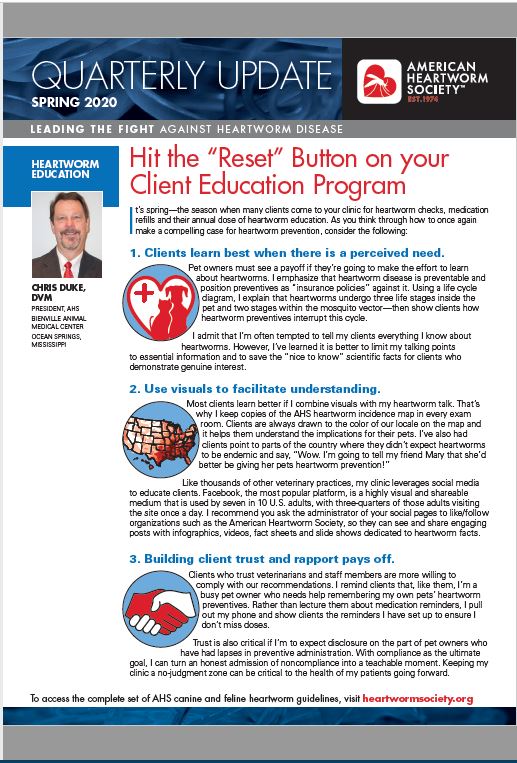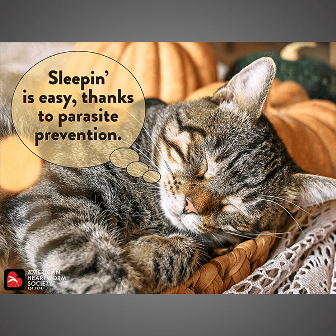Chris Duke, DVM, President, AHS
Bienville Animal Medical Center
Ocean Springs, Mississippi
Open/Download Quarterly Update as PDF
It’s spring—the season when many clients come to your clinic for heartworm checks, medication refills and their annual dose of heartworm education. As you think through how to once again
make a compelling case for heartworm prevention, consider the following:
1. Clients learn best when there is a perceived need.
Pet owners must see a payoff if they’re going to make the effort to learn about heartworms. I emphasize that heartworm disease is preventable and position preventives as “insurance policies” against it. Using a life cycle diagram, I explain that heartworms undergo three life stages inside the pet and two stages within the mosquito vector—then show clients how heartworm preventives interrupt this cycle.
I admit that I’m often tempted to tell my clients everything I know about heartworms. However, I’ve learned it is better to limit my talking points to essential information and to save the “nice to know” scientific facts for clients who demonstrate genuine interest.
2. Use visuals to facilitate understanding.
Most clients learn better if I combine visuals with my heartworm talk. That’s why I keep copies of the AHS heartworm incidence map in every exam room. Clients are always drawn to the color of our locale on the map and it helps them understand the implications for their pets. I’ve also had clients point to parts of the country where they didn’t expect heartworms to be endemic and say, “Wow. I’m going to tell my friend Mary that she’d better be giving her pets heartworm prevention!”
Like thousands of other veterinary practices, my clinic leverages social media to educate clients. Facebook, the most popular platform, is a highly visual and shareable medium that is used by seven in 10 U.S. adults, with three-quarters of those adults visiting the site once a day. I recommend you ask the administrator of your social pages to like/follow organizations such as the American Heartworm Society, so they can see and share engaging posts with infographics, videos, fact sheets and slide shows dedicated to heartworm facts.
3. Building client trust and rapport pays off.
Clients who trust veterinarians and staff members are more willing to comply with our recommendations. I remind clients that, like them, I’m a busy pet owner who needs help remembering my own pets’ heartworm preventives. Rather than lecture them about medication reminders, I pull out my phone and show clients the reminders I have set up to ensure I don’t miss doses.
Trust is also critical if I’m to expect disclosure on the part of pet owners who have had lapses in preventive administration. With compliance as the ultimate goal, I can turn an honest admission of noncompliance into a teachable moment. Keeping my clinic a no-judgment zone can be critical to the health of my patients going forward.








